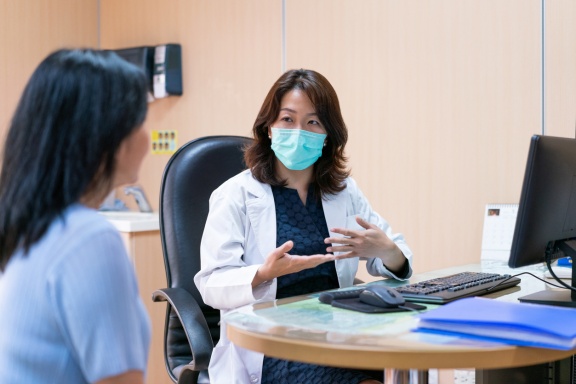Many of your employees have put off non-urgent health procedures, dental and vision appointments in the last two and a half months because of COVID-19 infection fears. Now that Vanderbilt Health and other providers have safely reintroduced care services, employees may be ready to reschedule those postponed visits. What should they expect?
For health appointments that must take place in person: Vanderbilt Health has restarted surgeries, procedures and clinical visits that have been paused or delayed during the COVID-19 epidemic—taking a careful approach that follows recommendations from the Centers for Disease Control and Prevention (CDC) and other trusted experts.
New safety practices at our hospitals, clinics and other facilities start before an appointment takes place. Patients will receive a call from their physician’s office to pre-screen them for symptoms of COVID-19. The office will ask where patients have traveled recently and whether they have had contact with a person diagnosed with COVID-19. They’ll also ask patients to wear a mask to their visit.
On the day of the appointment, patients will be asked to check in by phone and wait in the parking lot, or after they sign in, they can return to their vehicles and wait to be notified when clinicians are ready to see them. The provider’s staff will also screen patients’ temperature at the entrance and ensure they have on a mask. Staff will wear personal protective equipment (PPE) such as masks, gloves and gowns to protect themselves. To add to patients’ peace of mind, Vanderbilt Health has reconfigured its waiting rooms throughout its facilities to create more distance and removed all magazines and other disposable materials could be sources of contamination.
This Caring for You and Your Family graphic outlines more of what to expect during a Vanderbilt Health visit.
For appointments that can take place via telehealth: For Vanderbilt Health patients who don’t require an in-person appointment, My Health at Vanderbilt makes it easy for them to connect with their physicians via a telehealth visit for non-urgent health or prescription issues, as well as to communicate updates between visits. The service also includes a robust email messaging feature for quick answers to non-emergency health questions. Telehealth visits at VUMC have skyrocketed from an average of 10 a day in early March to more than 2,000 a day a month later, according to VUMC News.
Common issues that can be addressed through telehealth appointments include:
- Wellness visits and follow-up appointments
- Acute illnesses like rashes, colds and flu, and bladder infections
- Psychiatry and behavioral health issues
- Certain pediatric specialty appointments, such as developmental medicine and hearing and speech, and adult specialty appointments, such as cardiology and diabetes
- Prescriptions for common drugs like birth control, blood pressure medication, allergy medication, inhalers, and medications to treat minor illnesses like sinus infections
For dental care needs: In early May, dental offices were allowed to open throughout Tennessee for non-urgent dental appointments. Dental offices are following CDC recommendations to protect patients and staff. These precautions include asking questions about patients’ health before their visit, requesting they wear a mask and wait outside until the appointment, and taking their temperature when they arrive. Dental professionals will also be wearing more extensive PPE, such as different masks, face shields, gowns and goggles. The American Dental Association’s Mouth Healthy site provides more detail on what happens before, during and after a dental appointment.
Some insurance providers also offer virtual dental care options that allow patients to ask questions of licensed dentists via chat, as well as get prescriptions for antibiotics and non-narcotic pain relievers.
For vision care appointments: In April, the CDC removed the nationwide recommendation to postpone routine eye care due to COVID-19. Eye professionals are now using CMS’s Opening Up America Again guidance to reopen their practices for nonemergent and non-COVID-19 health care. Providers will screen patients for risk of COVID-19 before they come in for an eye exam and take additional precautions, such as requiring social distancing in the waiting area and spacing out appointments to ensure that there is adequate time for cleaning work areas between patients. The American Optometric Association’s website features patient resources and answers to frequently asked questions regarding COVID-19 eye health and vision care, and the American Academy of Ophthalmology site features a Coronavirus Guide for Eye Patients.
